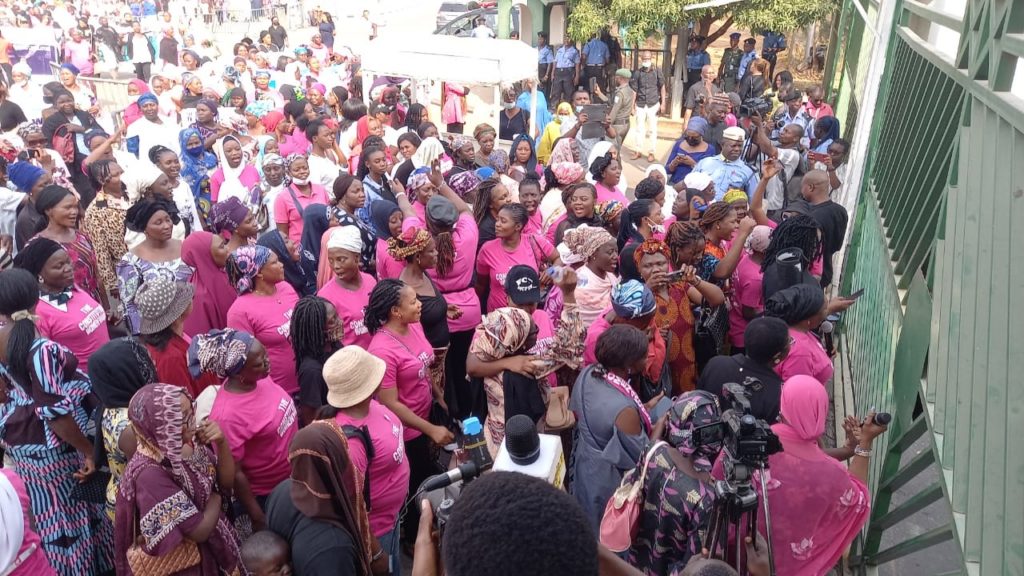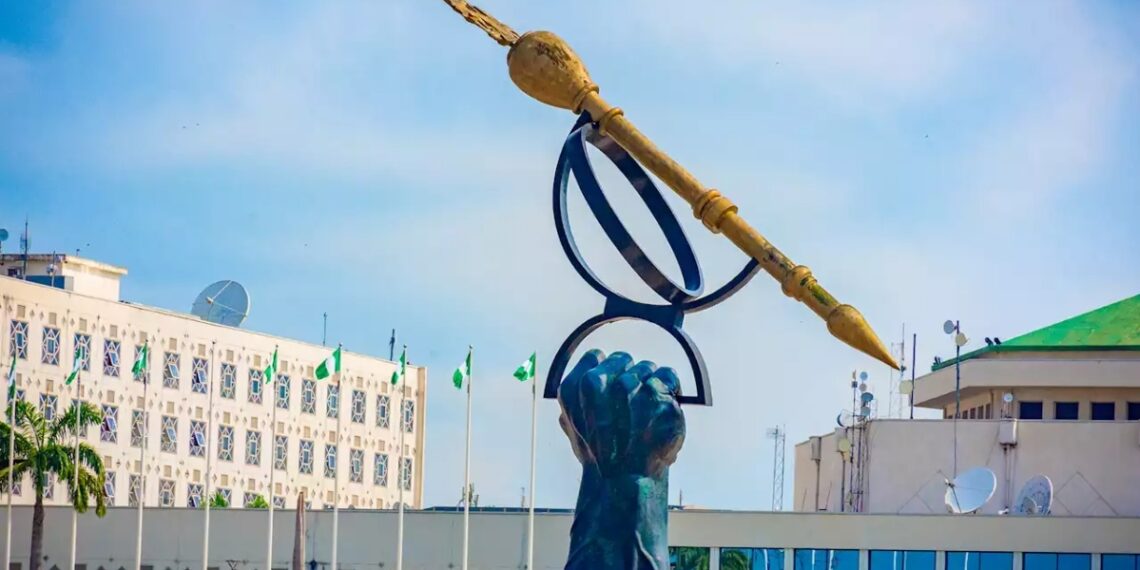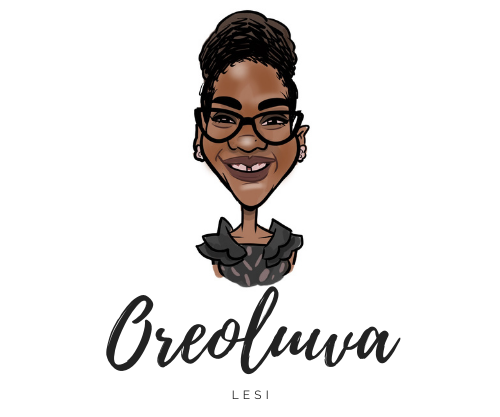
Nigerian women protesting at the National Assembly, Abuja. Source: The Street Post.
This month is International Women’s Month and International Women’s Day (on March 8). All round it’s a time to celebrate women and bring to the fore the discussions about reducing and eliminating gender-based inequalities.
The theme for this year’s International Women’s day is “Break the Bias“, which I’m sure you’ve started to see everywhere. By Tuesday, I have no doubt that you will be bombarded with thousands of photos of people holding up crossed arms, with corporates leading the way with beautifully-styled shoots of their staff.
Pardon me if I may sound a little cynical. Perhaps it’s because I am. March has turned into a month for governments and organisations to show that they are down with leveling the playing field for women – whether their actions on the remaining 364 days of the year actually back this up or not.
Women exist all the time; not just in March, so we should constantly be having conversations about how to improve professional, civic, political, economic, health and social outcomes for women and girls all through the year and working to translate these conversations into well-thought out and measurable plans, which are duly implememented.
In Nigeria, just this week, on the first day of women’s month, the National Assembly rejected several bills designed to bring some needed gender equity.
There were 68 proposed bills under review on March 1, as part of the ongoing review of Nigeria’s 1999 Constitution. At this stage, approval from two-thirds of the total members of each of the Senate and House of Representatives (HoR) is required for each constitutional amendment bill to pass.
For a bill to move to the next stage of the constitutional amendment process, it must be voted in favour of in BOTH the Senate and the House of Reps.So if it passes in one chamber but fails in the other, it fails to move to the next stage.
Of the 68 bills proposed for amending different provisions of the 1999 Constitution, five were directly related to gender equality, covering the following:
1.) Reserved Seats: This Reserved Seat Bill is to amend, among others, Sections 48, 49, and 71 of the 1999 Constitution to create a total of 111 additional seats for women representatives of their senatorial districts and constituencies, both at the national and state houses of assemblies.The current National Assembly (NASS) is made-up of 95.5% men and the idea behind this bill was to add seats for women, without amending the current number of seats.
Results: Fail
Senate – Yes: 30, No: 58 (Fail)
HoR – Yes: 81, No: 208 (Fail)
2.) Citizenship: The amendment bill seeks to provide for citizenship by registration for foreign spouses of Nigerian women by amending Section 26 of the 1999 Constitution, which grants a foreign woman married to a Nigerian man the right to become a Nigerian citizen, whereas the same right is not extended to a foreign man married to a Nigerian woman.
Results: Fail
Senate – Yes: 83, No: 2 (Pass)
HoR – Yes: 135, No: 143 (Fail)
3. and 4.) Affirmative Action: This bill seeks to amend Section 223 of the 1999 Constitution to provide 35% affirmative action to ensure women occupy at least 35% in political party administration and appointive positions across Federal and State levels.
Results: Fail
Senate – Yes: 34, No: 53, Abstain: 3 (Fail)
HoR – Yes: 195, No: 107 (Pass)
However, the bill providing at least 20% of women as ministers or commissioners nominees passed in both chambers.
5.) Indigeneship: The Indigeneship Rights Bill is to alter Sections 31 and 318(1) (the Interpretation Section) of the 1999 Constitution to allow a woman to become an indigene of her husband’s state after at least five years of marriage. Women are typically denied the opportunity to hold elective or appointive positions in their husbands’ states, while also being restricted in their opportunities in their birth states of origin because they are married to a person from another state.
Results: Fail
Senate – Yes: 90, No: 5 (Pass)
HoR: Yes: 193, No: 98 (Fail)
According to the House of Representatives’ spokesperson, Mr. Ben Kalu (APC, Abia) the lobbying for the gender bills proposed during the constitution amendment started too late.
The senator representing Ekiti South Senatorial District, Senator Abiodun Olujimi, countered this assertion in an interview with The Guardian, stating “It has taken us two years and beyond the two years, we had spoken to everybody that we thought mattered on the issue and we got support. It is very painful to find out that all of them [the bills] didn’t survive.”
Two years sounds like a long enough time to me to lobby for these bills. To make it worse, some NASS members who had committed to voting in favour for the bills appeared to have changed their minds and voted against them or abstained.
House of Representatives Deputy Chief Whip Ms. Nkiruika Onyejeocha who sponsored the bill seeking for additional seats for women in both the National and State Houses of Assembly, told reporters that some of those who voted against the bill were part of those who had their names on the bill as co-sponsors,
According to the United Nations, through its UN women representative to Nigeria and the Economic Community of West African States (ECOWAS), Ms. Comfort Lamptey, said that women’s representation at the national parliament is 3.6 per cent; ministerial appointment is about 16 percent, while only 9.8 percent of local government elected seats are women. Nigeria is currently ranked 184 out of 187 countries in the women’s political representation index.
It was truly a “show of shame” as it has been described by the Minister of Women Affairs, Pauline Tallen.
And in case, we think this is just a fight against gender biases, it’s also about the determination by those who are already in power and well-entrenched in the power structures to ensure that they never lose grip on power. Afterall, let’s note that the bill proposing voting by Nigerians in the diaspora was also shot down.
Power is never given. It’s taken.

We all need to wake-up to the fact that our current set of “leaders” are not going to “give” women anything. Instead, we need to organise ourselves into the powerful advocacy and voting block that we have the potential to be.
So what can you do?
You can:
- Find out who your representative is and register your displeasure about the NASS voting.
- Register to vote in the 2023 elections
- Join the ongoing protests and rallies in Abuja
- Write, talk about it
- Pay attention to what the leadership is doing and make a lot of noise about what you aren’t happy about
- Support credible candidates with your voice, vote and money
For all of us women, this March is not about making the rounds of the “women’s conferences” saying the same old things. It’s not about being trotted out for photo ops by organisations and groups that want to appear to be in favour of gender equity.
In this month and beyond, it is absolutely crucial that we ensure that we recognise the power we posses as women and wield that power.
Sources:

Recent Comments